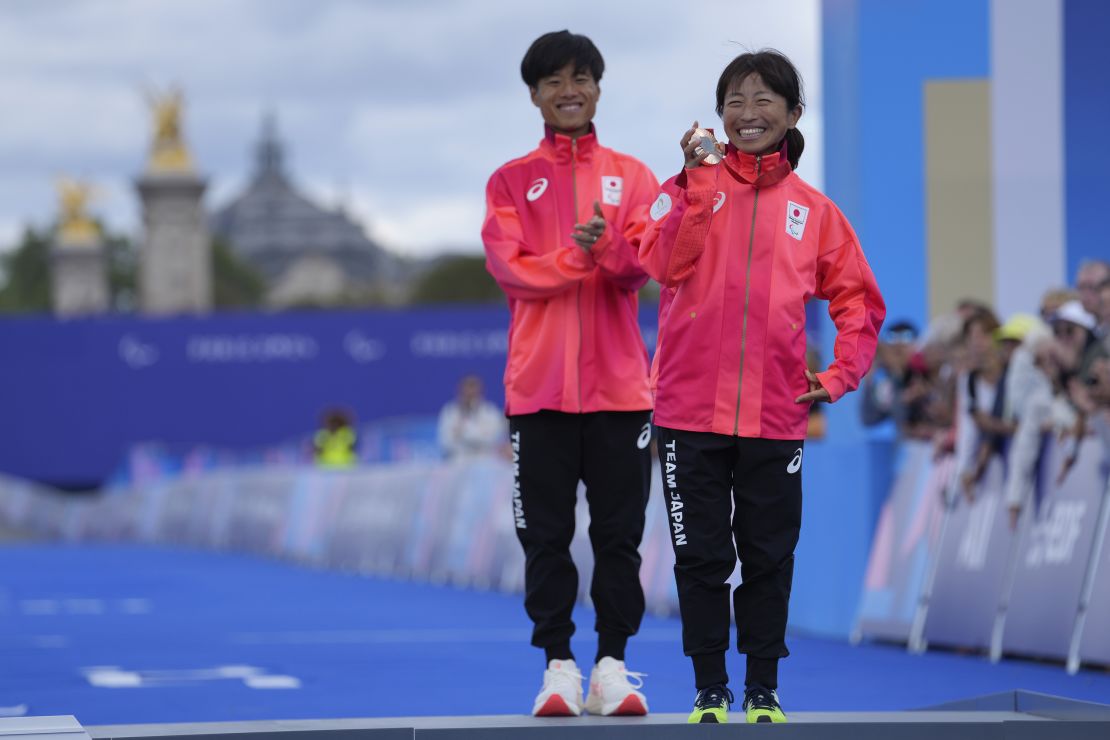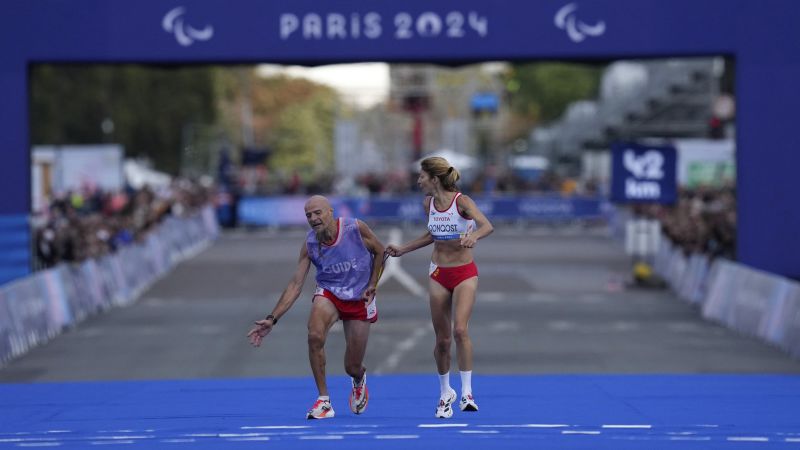CNN
—
As visually impaired Spanish runner Elena Congost approached the finish line in the women’s T12 marathon on the final day of the Paralympics, she and her guide, Mia Carol, began to discuss the bronze medal they were about to win.
Having run for three hours, Congost and Carol were a good three minutes ahead of Japan’s fourth-placed Misato Michishita and her guide. So comfortable was their lead that, with Carol cramping up, Congost agreed to slow down.
But just 10 yards away from the finish line, Carol stumbled. Congost helped him, briefly letting go of the tether – which blind and visually impaired runners use so that their guide can keep them on the right track – to stop Carol from falling to the ground.
With Carol running steadily again, he and Congost crossed the finish line to claim the bronze medal – or so they thought. Shortly after, organizers ruled that Congost was disqualified from the race for letting go of the tether to help her guide.
Rule 7.9.3 of the World Para Athletic Rules and Regulations states: “The athlete and their accompanying guide-runner shall retain the tether attachment from the start of the race until the end of the race” and that “No release shall be allowed until after the athlete and their accompanying guide-runner have both reached the vertical plane of the nearer edge of the finish line and finished the race.”
“I couldn’t believe what was happening,” Congost told CNN Sport. “I’d worked so hard, I’d fought, I’d tried my best. So many people have helped me, and they deserve that celebration with the medal.
“This rule was written because there were some years when athletes crossed the finish line alone without their guide,” she continued. “But this case has nothing to do with that reason. Nobody pushes me, nobody lets go of me, the tether simply falls while I’m helping him.
“We could have crossed the finish line walking.”
CNN Sport has contacted World Para Athletics and the International Paralympic Committee for comment.
A ‘quite unpleasant’ comeback
Congost won gold in the women’s T12 marathon at the 2016 Olympics in Rio de Janeiro, but did not compete three years ago in Tokyo, having had four children in the years following her success in Brazil.
Taking bronze in Paris would have capped a remarkable comeback for the 36-year-old, and after the race, Congost said that she had been motivated by the thought of her children – two of whom, aged four and six, were waiting for her at the finish line.
“I told (reporters) that I was very happy, above all for my children, because they saw me training, they saw me fight, they saw me cry, they saw me laugh. They are aware of how difficult it has been for me,” she told CNN.
“It was also a way of teaching them that when you fight and you work and you strive, you end up achieving things.”
The Spaniard was with her two children by the time she was told the bronze medal would not be hers.
“They missed the beautiful part of the celebration, and instead they saw me crying,” said Congost. “They also ended up crying. It was quite unpleasant.
“My eldest, who is six, didn’t understand what was going on. He was asking, ‘Why have you been punished for helping him?’ As a mother, what I always try to teach is that if someone needs help, you have to help them.
“I had to explain that injustices exist in the world and that sometimes doing things right doesn’t mean being rewarded. I don’t know if they ended up understanding it or not because they are very small.”
Congost believes that, in disqualifying her for helping Carol, judges went against the spirit of the Paralympic Games.
“As well as the high-level competition, the most important thing that the Games transmit is values. Most children who play sports will never make it to an Olympic Games or win medals, but sport helps them to form themselves as people and transmits values for daily life,” she said.
“Just like a soccer player is asked to be responsible when they foul someone, insult someone, or do something ugly, I believe it is our responsibility to show beautiful things. What I did ended up being costly, but I think there is a lot to teach behind that action.”
The price of a good deed
Congost is not lying when she says that the decision has cost her. She said the bronze medal would have come with a prize of more than $33,000 (€30,000), but the athlete is equally worried about her grant, which the Spanish Paralympic Committee (SPC) normally only pays out to athletes who win medals.
“It also affects my salary for each month because, at the end of the day, this is my job,” she explained. “The Spanish Paralympic Committee, thanks to pressure from the media, issued a statement on (September 8) that they would give me the grant as if I were a medalist. So that has given me a lot of peace of mind.”
The SPC’s September 8 statement read: “Considering Elena’s magnificent performance today, we will propose the awarding of a grant at the next meeting of the decision panel that we share with the National Sports Council and the Spanish Federation of Sports for Blind People.”
The SPC told CNN that no date has yet been set for this meeting.
In another statement made the following day, the SPC said: “The Spanish Paralympic Committee is preparing a letter to request that World Para Athletics award the bronze medal to Elena Congost and her guide Mia Carol in the T12 marathon event.”
Having made the appeal, the SPC is now waiting on the decision and will not pay out Congost’s grant until World Para Athletics has ruled on the matter.
“Now, I have a few months where I cannot earn, I have to wait,” said Congost. “(The Spanish Paralympic Committee) will pay me retroactively, they have promised. But I have to wait, I don’t know how long, without any kind of financial support.”

Congost is adamant that Michishita, the Japanese runner who finished behind her, is not deserving of the bronze medal she was presented with.
“The other day, her guide wrote to me on Instagram saying that she wanted to run with me again,” she said. “I took advantage of the message to say what I thought, politely and respectfully. I told him that I thought that the decision the Japanese team had made was very cruel. A marathon is 42.195 kilometers, and I had run 42.19 kilometers perfectly and was three minutes ahead. What I did didn’t alter the outcome, didn’t benefit me and didn’t bother anyone.
“I asked if they could apologize, even return the medal. I also said that as an athlete, if I had known about this situation from a colleague, I would never have accepted it. Because she knows, I know, and everyone knows that this medal isn’t theirs, it’s ours.”
In a statement, the Japanese Paralympic Committee told CNN that the result of the race “follows World Para Athletics’ rules and regulations.” Both the Committee and Michishita declined to comment further.
Congost has already decided how she will celebrate if she is successful in her appeal.
“That moment on the podium, they have stolen it from us. We will never have that,” she said. “But my coach has promised me that, if at any time they give us the medal, we will return to Paris, to the Eiffel Tower, and take a picture with the medal.”






